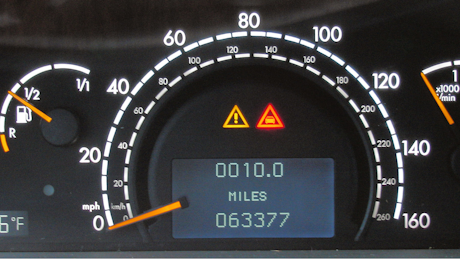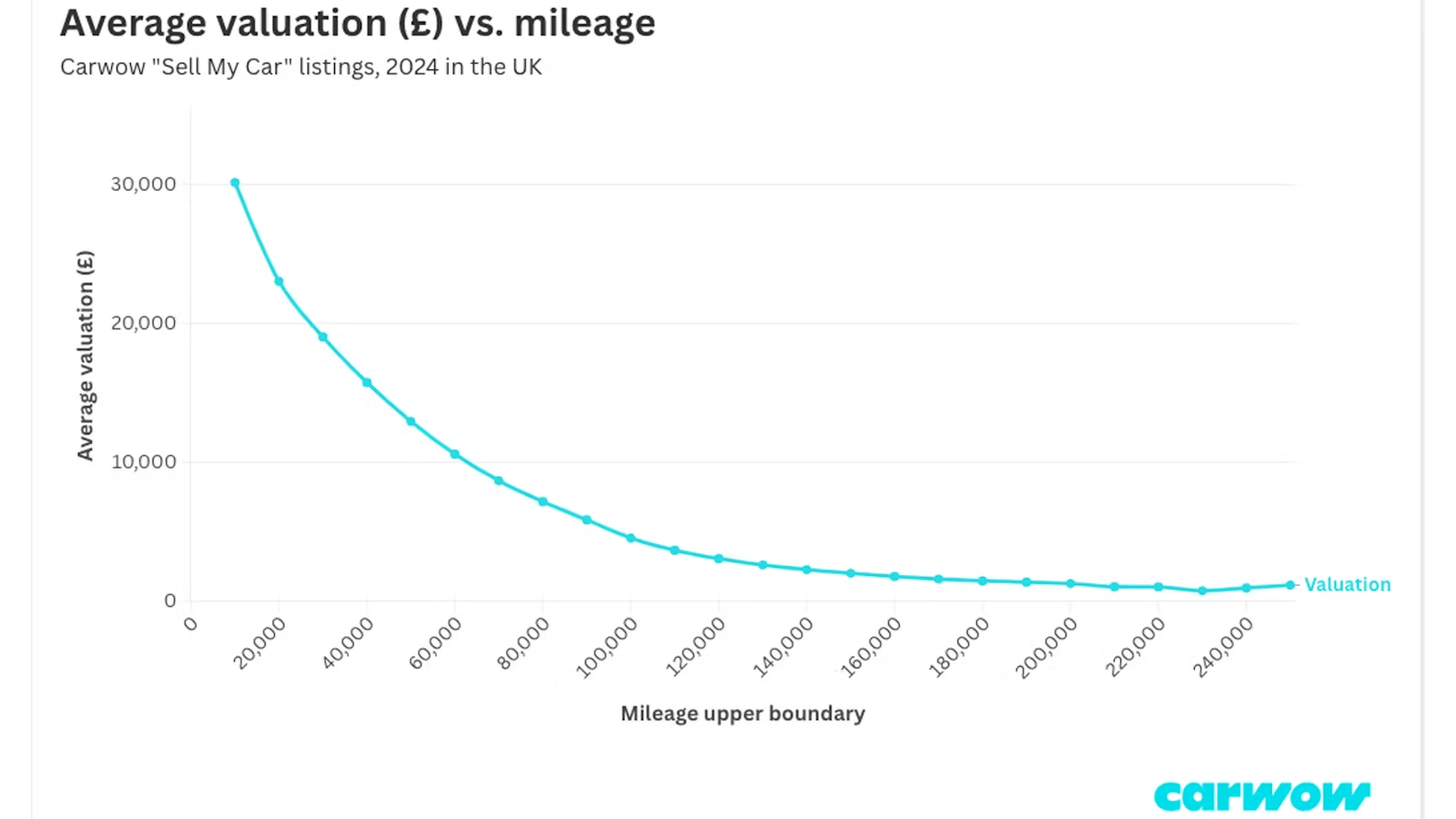How much does mileage affect car value?
February 12, 2025 by Jamie Edkins

As cars get older, they lose value, or depreciate, to use the lingo of buying and selling a car. However, age isn’t the only factor in deciding how much a used car is worth.
Here, we’ve used the accumulated knowledge of the Carwow team to explain the part mileage plays in the value of your car.

Why does mileage affect a car’s value?
The true mileage of a car is the amount of ground covered since it left the factory, offering an indication of the wear on important (and costly to fix) components such as the engine and gearbox.
Cars that have racked up a mileage that is above the average will usually be worth less than an equivalent model with fewer miles on the clock, because it is more likely to suffer from mechanical failures, due to worn-out components, in the future.
The cabin can also be more worn on higher-mileage cars, with the seats’ upholstery (especially if it’s leather) and steering wheel showing how much they’ve been used.
It’s worth noting, however, that a car’s service history also has a big impact on its value: a car with 50,000 miles but no service history is less desirable than one with 80,000 miles on the clock and a fully stamped service book.
How does mileage affect the value of my car?
An easy broad-brush way to calculate a car’s loss of value is to use 20,000-mile bands: every time your car goes through one of these bands it loses about 20% of its value. This is a very rough estimate though.
If you bought a new car for £30,000, after 20,000 miles it will be worth £23,000. Drive it 40,000 miles and it’ll be worth around £16,200 and so on.
Unfortunately, this isn’t an exact science, because so many other factors affect your car’s depreciation such as condition, service history and the number of cars on sale of the same make and model.
And, of course, there are the immutable economic laws of supply and demand: your car is ultimately worth exactly what somebody else is willing to pay for it.
By analysing our Sell My Car data, we discovered just how severely mileage impacts car values depending on how many miles drivers have tallied up during their use.
How much value (£) a car loses per 10,000 miles:

The graph above shows that the value drops significantly between 10,000 and 60,000 miles, and by around 100,000 miles the depreciation levels off.
The most value is lost when cars surpass 20,000 miles, dropping by an average of 24% compared to their value at 10,000 miles.[1]
For comparison, those with between 20,000 and 90,000 miles on their car only see an average drop in value of around 17%.
Cars that have clocked over six figures will then see a further drop of 19% – an average loss of £879 when hitting 110,000 miles. To find out what your car is really worth in just two minutes use Carwow’s online car value check.
How does mileage affect the value of car brands?
Our data also reveals which car makes are the least impacted by high mileage. The table below details which brands sold using Carwow show the lowest drop in value for the mileage they covered compared to their value with the same mileage three months ago.
Car brands with the least depreciation per mileage bracket:[1]
| Mileage | Petrol brand | 3-month value drop (%) | 3-month value drop (£) |
| 220,000 | Mini | 48.00% | £390.00 |
| 210,000 | Land Rover | 39.00% | £517.50 |
| 200,000 | Nissan | 9.00% | £76.67 |
| 190,000 | Toyota | 11.00% | £372.32 |
| 180,000 | Seat | 1.00% | £15.63 |
| 170,000 | Ford | 2.00% | £27.59 |
| 160,000 | Renault | 2.52% | £13.61 |
| 150,000 | Skoda | 1.78% | £21.13 |
| 140,000 | Nissan | 15.22% | £253.57 |
| 130,000 | Porsche | 1.34% | £84.90 |
| 120,000 | BMW | 0.84% | £30.56 |
| 110,000 | Peugeot | 1.01% | £10.39 |
| 100,000 | Citroen | 0.12% | £1.64 |
| 90,000 | Mitsubishi | 1.21% | £90.60 |
| 80,000 | Ford | 0.12% | £4.36 |
| 70,000 | Toyota | 0.18% | £10.98 |
| 60,000 | Mitsubishi | 1.06% | £99.46 |
| 50,000 | Citroen | 1.99% | £105.94 |
| 40,000 | Citroen | 1.21% | £79.03 |
| 30,000 | Peugeot | 1.26% | £141.79 |
| 20,000 | Mini | 4.02% | £665.08 |
| 10,000 | Kia | 0.33% | £64.24 |
| Mileage | Diesel brand | 3-month value drop (%) | 3-month value drop (£) |
| 220,000 | Mercedes | 21.71% | £367.58 |
| 210,000 | Mercedes | 7.00% | £16.89 |
| 200,000 | Audi | 1.63% | £23.99 |
| 190,000 | Land Rover | 0.14% | £3.31 |
| 180,000 | Kia | 4.05% | £54.58 |
| 170,000 | Toyota | 1.00% | £19.03 |
| 160,000 | Ford | 3.70% | £71.25 |
| 150,000 | Honda | 1.57% | £25.68 |
| 140,000 | Skoda | 1.94% | £60.69 |
| 130,000 | Honda | 1.32% | £31.03 |
| 120,000 | Honda | 0.03% | £0.85 |
| 110,000 | Fiat | 0.93% | £17.56 |
| 100,000 | Dacia | 1.89% | £54.17 |
| 90,000 | Volkswagen | 0.04% | £3.17 |
| 80,000 | Volvo | 0.06% | £5.78 |
| 70,000 | Audi | 1.24% | £153.89 |
| 60,000 | Kia | 1.72% | £90.67 |
| 50,000 | Suzuki | 0.90% | £79.17 |
| 40,000 | Kia | 2.98% | £385.46 |
| 30,000 | Honda | 1.37% | £192.71 |
| 20,000 | Land Rover | 2.31% | £863.80 |
| 10,000 | Skoda | 2.52% | £705.68 |
What is ‘normal’ mileage for a car?
Calculating a ‘normal’ mileage for a car isn’t a straightforward exercise. Data from the Department for Transport suggests that British drivers cover between 5,000 and 7,000 miles per year. However, 10,000 miles per year is also common, so this is what is generally considered as a ‘normal mileage’.
Using this figure as a basis, if you multiply the age of the car by 10,000, you can calculate the average mileage: for example, a three-year-old car would have an average of 30,000 miles.
Is mileage affected by car type?
It’s not always the quantity of miles covered by a car that determines its value: sometimes, the quality of those miles can count, too.
Company cars, for example, will probably be driven frequently and might have had multiple drivers – and not all them will perhaps treat the car as if it was their own. In this kind of case, average mileage shouldn’t be judged as if this was an average car.
This is particularly true of diesel cars, which have been very popular for fleet use in the last decade or so. Diesel cars offer better fuel economy, so people who drive long distances will have chosen them as their car of choice.
Another example is cars that have predominantly been driven in urban environments. The regular gear changes, clutch use (in a manual car) and starting and stopping will all induce more wear and tear than on a car that is used more for longer journeys at cruising speeds.
On the other hand, cars that have been mostly used on rural roads will have experienced different wear and tear, with perhaps the suspension having a torrid time on our potholed country roads.
Carwow’s data also shows petrol cars are depreciating faster than electric vehicles. By 30,000 miles, the average petrol car has lost 38% of its value, while EVs have only dropped 26%. Hybrids perform even better, with just 11% depreciation in the same period.
What mileage can a car reach before it ‘dies’?
How long a car stays roadworthy depends on how well it’s been looked after. With regular maintenance and servicing it, a car can often cover 200,000 miles in its lifetime.
It’s worth bearing in mind, however, that maintenance will get more expensive as the miles rise. Components such as the clutch and brake discs will need replacing on higher-mileage cars – and you might need more drastic work, such as a replacement gearbox or engine.
Not adhering to the manufacturer’s service schedule will also more likely result in these kinds of drastic mechanical failure when the mileage is high.
If this happens to your car, you can pay to have it fixed, but this will often involve spending more than the car is worth. The alternative is to either scrap it or sell it to a dismantler for parts.
Can I sell a car with high mileage?
According to our internal survey data, 42% of people selling their car want it gone as quickly as possible.[2]. You can sell a car that has recorded a high mileage, but it can sometimes prove to be a headache. Cars with huge miles are less appealing on the used market, because buyers usually want something less worn.
Our data highlights just how crucial it is for car owners to act quickly, especially if they have high mileage vehicles. Waiting around to sell could result in a substantial drop in valuation price. As the market evolves, seizing this window of opportunity becomes key for those looking to get the most out of selling their car.
Of course, there are many factors that can affect the value of a car, such as the model, any damage the car might have and any modifications that have been made. However, mileage is one of the key factors that play into a car’s value and understanding just how much of an effect this has can help car owners in the decision-making process.
Car change? Carwow!
Looking for a new set of wheels? With Carwow you can sell your car quickly and for a fair price – as well as find great offers on your next one. Whether you’re looking to buy a car brand new, are after something used or you want to explore car leasing options, Carwow is your one stop shop for new car deals.
About this data:
[1] The valuation data based on mileage was taken from Carwow’s internal Sell My Car database. Valuations were taken from October and December 2023 and depreciation rates were calculated based on the average valuation per car brand and fuel type.
[2] Statistics relating to the number of people stating that they’re looking to sell their car as soon as possible comes from a survey of 500 UK residents in December 2023.















